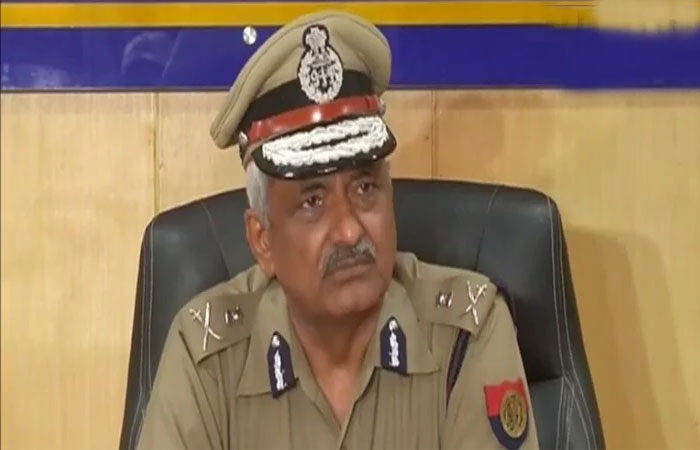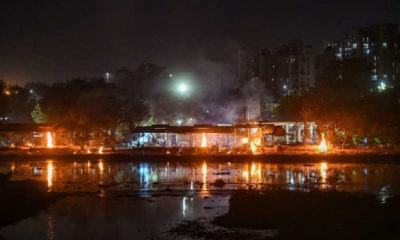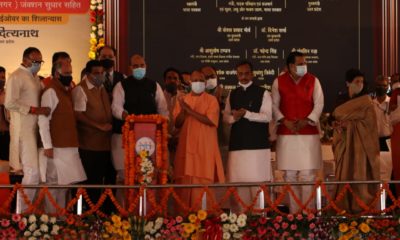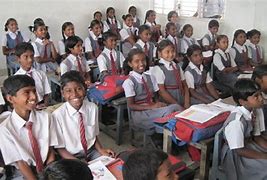Feature
Anti-Romeo Squad to returns in new ‘Avtaar’ in Uttar Pradesh

Lucknow: After a lot of propoganda on Anti-Romeo Squad, Uttar Pradesh police is all set to bring anti-Romeo Squad in new ‘avtaar’. Teams that will have trained, sensitized personnel to keep a check on eve-teasing and stalkers.
The new teams are said to have undergone a curriculum designed by Women Power Line, with 3 areas of focus: behavioural, legal and practical.
The controversial anti-Romeo squads, which drew widespread criticism for moral policing and harassing young couples in the name of women safety, will soon be back to patrol Uttar Pradesh streets. However, the state police chief claims, the new teams will comprise a polite, observant and trained set of personnel who will act as a deterrent only to eve-teasers and stalkers.
A pre-poll promise of the Bharatiya Janata Party, the drive was aimed at punishing molesters and harassers in public places. However, vigilante groups took over the exercise, often targeting young couples and handing out embarrassing punishments.
State DGP Sulkhan Singh in an exclusive interview to media said “Earlier, these squads were not trained. They were often over-enthusiastic and took foolish actions like chasing young people and grilling them,” this brought bad name to a well-meaning exercise.”
According to Singh, the new teams underwent a curriculum designed by the Women Power Line, a unit for prevention and detection of crime against women, with three areas of focus behavioural, legal and practical.
“They only have to be vigilant and observant about situations and see if a man or a group of men are harassing women. They are being taught that. Training is over in 30 of the 75 districts,” said the IPS officer who was DG (training) before being elevated by chief minister Yogi Adityanath.
The top cop assured that there will be no more arrests, shaving of heads, blackening of faces or murga punishments (a stress position of holding ears) or chasing of couples at public parks, college campuses, railway stations and shopping malls in the name of curbing eve-teasing or protecting women.
Singh said the squad will also be asked to use body cameras to protect themselves from charges of human rights violations or other wild allegations. These teams will not be given the power to investigate but only detain the stalkers, rowdy elements and issue warnings after “careful observation of a situation”.
The curriculum also conducted sensitization classes of policemen where they were taught to how to behave with young couples and spot a suspicious character.
Supporting the need for such a squad, Singh said it was necessary to prevent teasing, molestation or harassment of women at public place and instill a sense of security among people.
The Allahabad high court in March had upheld Yogi Adityanath government’s move to set up these squads but cautioned that the police must act only as per law and not “outside its purview”.
The move invited criticism from several quarters following allegations that the police were invading private space of citizens. The opposition even sought Central intervention into what they alleged “violation of the Constitution” by allowing anti-Romeo squads to “ridicule democracy and the freedom of youngsters”.
Entertainment
Meghalaya Reserves Legalized Gambling and Sports Betting for Tourists

The State Scores Extra High on Gaming-Friendly Industry Index
Meghalaya scored 92.85 out of 100 possible points in a Gaming Industry Index and proved to be India’s most gaming-friendly state following its recent profound legislation changes over the field allowing land-based and online gaming, including games of chance, under a licensing regime.
The index by the UK India Business Council (UKIBC) uses a scale of 0 to 100 to measure the level of legalisation on gambling and betting achieved by a state based on the scores over a set of seven different games – lottery, horse racing, betting on sports, poker, rummy, casino and fantasy sports
Starting from February last year, Meghalaya became the third state in India’s northeast to legalise gambling and betting after Sikkim and Nagaland. After consultations with the UKIBC, the state proceeded with the adoption of the Meghalaya Regulation of Gaming Act, 2021 and the nullification of the Meghalaya Prevention of Gambling Act, 1970. Subsequently in December, the Meghalaya Regulation of Gaming Rules, 2021 were notified and came into force.
All for the Tourists
The move to legalise and license various forms of offline and online betting and gambling in Meghalaya is aimed at boosting tourism and creating jobs, and altogether raising taxation revenues for the northeastern state. At the same time, the opportunities to bet and gamble legally will be reserved only for tourists and visitors.
“We came out with a Gaming Act and subsequently framed the Regulation of Gaming Rules, 2021. The government will accordingly issue licenses to operate games of skill and chance, both online and offline,” said James P. K. Sangma, Meghalaya State Law and Taxation Minister speaking in the capital city of Shillong. “But the legalized gambling and gaming will only be for tourists and not residents of Meghalaya,” he continued.
To be allowed to play, tourists and people visiting the state for work or business purposes will have to prove their non-resident status by presenting appropriate documents, in a process similar to a bank KYC (Know Your Customer) procedure.
Meghalaya Reaches Out to a Vast Market
With 140 millions of people in India estimated to bet regularly on sports, and a total of 370 million desi bettors around prominent sporting events, as per data from one of the latest reports by Esse N Videri, Meghalaya is set to reach out and take a piece of a vast market.
Estimates on the financial value of India’s sports betting market, combined across all types of offline channels and online sports and cricket predictions and betting platforms, speak about amounts between $130 and $150 billion (roughly between ₹9.7 and ₹11.5 lakh crore).
Andhra Pradesh, Telangana and Delhi are shown to deliver the highest number of bettors and Meghalaya can count on substantial tourists flow from their betting circles. The sports betting communities of Karnataka, Maharashtra, Uttar Pradesh and Haryana are also not to be underestimated.
Among the sports, cricket is most popular, registering 68 percent of the total bet count analyzed by Esse N Videri. Football takes second position with 11 percent of the bets, followed by betting on FIFA at 7 percent and on eCricket at 5 percent. The last position in the Top 5 of popular sports for betting in India is taken by tennis with 3 percent of the bet count.
Local Citizens will Still have Their Teer Betting
Meghalaya residents will still be permitted to participate in teer betting over arrow-shooting results. Teer is a traditional method of gambling, somewhat similar to a lottery draw, and held under the rules of the Meghalaya Regulation of the Game of Arrow Shooting and the Sale of Teer Tickets Act, 2018.
Teer includes bettors wagering on the number of arrows that reach the target which is placed about 50 meters away from a team of 20 archers positioned in a semicircle.
The archers shoot volleys of arrows at the target for ten minutes, and players place their bets choosing a number between 0 and 99 trying to guess the last two digits of the number of arrows that successfully pierce the target.
If, for example, the number of hits is 256, anyone who has bet on 56 wins an amount eight times bigger than their wager.


























